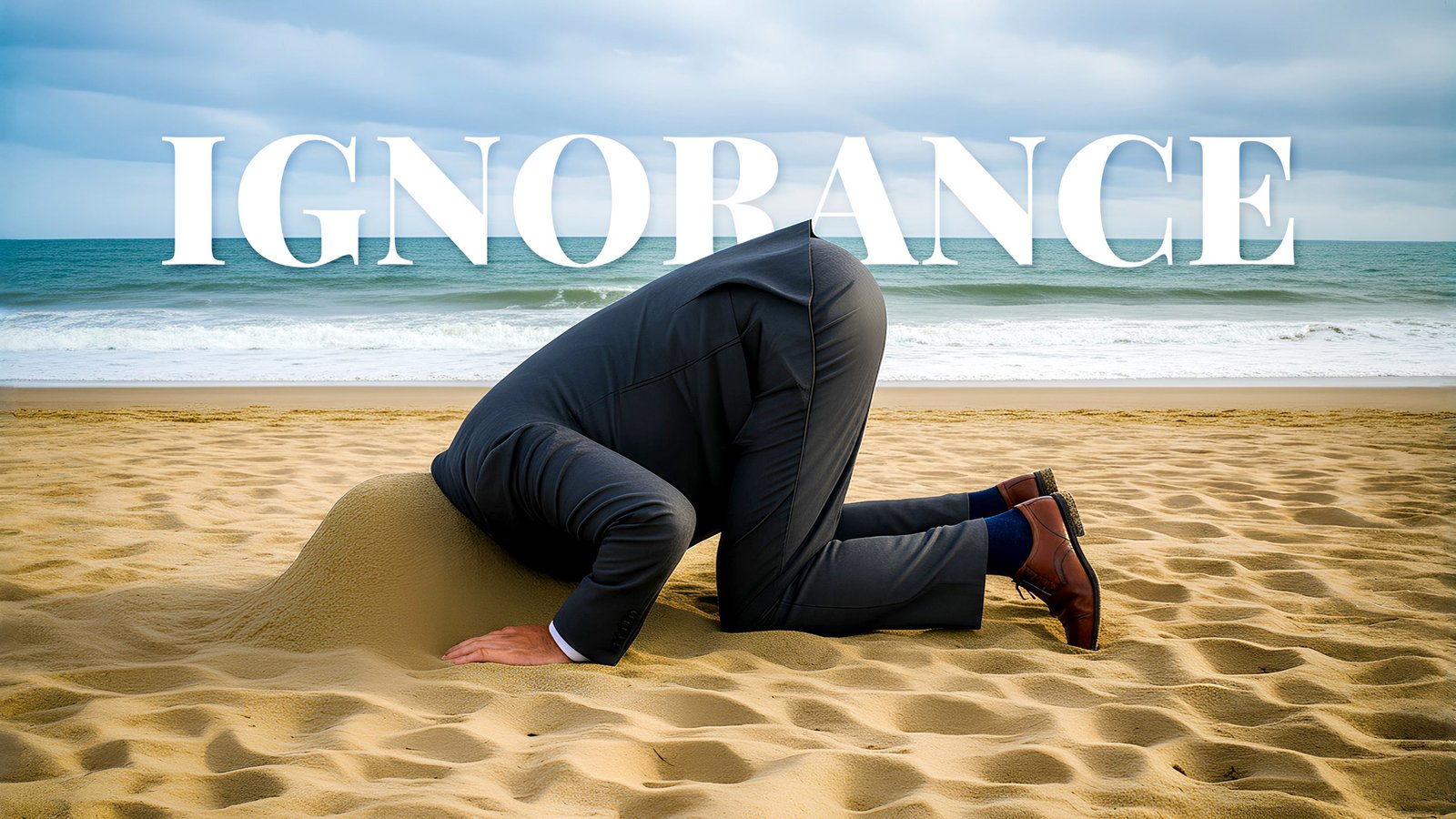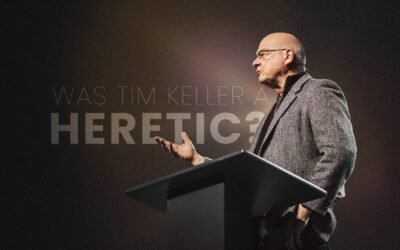I’ve recently taken notice of people excusing all sorts of bad behaviour, words, and attitudes because of a person’s “ignorance”. Even many Christians can believe that ignorance excuses guilt. You hear it all the time in remarks like, “Oh, she doesn’t know any better… she’s really got a good heart.”
However, ignorance is not atonement—it cannot remove guilt.
So, is ignorance actually a catch-all excuse? I think that perhaps many people don’t realize the spiritual danger of ignorance.
In our modern age, where information flows like a torrent from every device and screen, it’s tempting to assume that ignorance is always an innocent oversight—a mere gap in knowledge that excuses us from responsibility. But the Bible paints a far more sobering picture. It reveals a God who is infinitely merciful toward those who stumble in the dark without knowing better, yet who holds us accountable when we deliberately turn away from the light He provides. There comes a point when ignorance ceases to be a shield and becomes a sword we wield against ourselves—and against God. This isn’t some abstract theological quibble; it’s a urgent call to examine our hearts, lest we find ourselves destroyed not by what we don’t know, but by what we refuse to learn.
Innocent vs Willful Ignorance
The Bible distinguishes between unintentional or innocent ignorance (which may still involve sin but is treated with mercy and opportunities for atonement) and willful ignorance (which crosses into sin itself).
In the Old Testament, provisions are made for “sins of ignorance” or unintentional transgressions, such as in Leviticus 4:2, where it states, “Speak to the people of Israel, saying, If anyone sins unintentionally in any of the Lord’s commandments about things not to be done, and does any one of them.” These are sins committed without full awareness, and the Law required sacrifices to atone for them (e.g., Leviticus 5:17-18), implying that ignorance doesn’t excuse the act but mitigates the severity compared to deliberate rebellion.
In the New Testament, ignorance is sometimes shown as a basis for God’s mercy, as in 1 Timothy 1:13, where Paul writes of his past persecution of Christians: “Though formerly I was a blasphemer, persecutor, and insolent opponent. But I received mercy because I had acted ignorantly in unbelief.” Similarly, Jesus prays for forgiveness for those crucifying him, saying, “Father, forgive them, for they know not what they do” (Luke 23:34). God is described as overlooking “times of ignorance” in the past but now commanding repentance (Acts 17:30).
Ignorance becomes sinful when it is willful— that is, when knowledge of God’s truth, law, or will is available or evident, yet deliberately rejected, ignored, or not pursued due to a hardened heart.
This is emphasized in Hosea 4:6: “My people are destroyed for lack of knowledge; because you have rejected knowledge, I reject you from being a priest to me. And since you have forgotten the law of your God, I also will forget your children.” Here, the ignorance isn’t innocent; it’s a choice to reject or forget knowledge, leading to destruction and divine rejection. Ephesians 4:18 further connects this to sin: “They are darkened in their understanding, alienated from the life of God because of the ignorance that is in them, due to their hardness of heart.” Willful ignorance of God’s will is itself sin, as it opens the door to further transgressions and vulnerability to evil (e.g., 2 Corinthians 2:11 warns against being ignorant of Satan’s schemes).
The Bible also contrasts this with calls to seek wisdom and knowledge actively, as in James 1:5: “If any of you lacks wisdom, let him ask God, who gives generously to all without reproach, and it will be given him.” Failing to do so when prompted or when evidence of God is clear (Romans 1:18-23) turns ignorance into culpable sin. Additionally, Hebrews 10:26 warns that sinning willfully after receiving knowledge of the truth leaves no further sacrifice for sins, underscoring the gravity of choosing ignorance post-enlightenment.
In essence, the turning point is when ignorance shifts from being invincible (unavoidable due to lack of access) to vincible (overcomable but rejected), though the Bible doesn’t use those exact terms—it frames it around heart attitude, rejection of knowledge, and failure to repent when called.
The Biblical Distinction: From Mercy to Judgment
To grasp this shift more fully, let’s delve deeper into Scripture’s framework.
The Old Testament sacrificial system, as outlined in Leviticus and Numbers, draws a clear line between sins committed “unintentionally” (Hebrew: beshagagah, often translated as “in error” or “ignorantly”) and those done “with a high hand” (Numbers 15:30-31), meaning defiantly or presumptuously. For the former, atonement was available through offerings like the sin offering (chatta’t), which symbolized God’s gracious provision for human frailty. As Numbers 15:27-28 explains, “If one person sins unintentionally, he shall offer a female goat a year old for a sin offering. And the priest shall make atonement before the Lord for the person who sins unintentionally… and he shall be forgiven.” This reflects God’s mercy toward our finite understanding—He knows we are dust (Psalm 103:14)—but it also underscores that even ignorant sins defile and require cleansing, pointing forward to the ultimate sacrifice in Christ.
Yet, for high-handed sins, no sacrifice sufficed; the offender was to be cut off from the people (Numbers 15:30). This anticipates the New Testament’s warnings against willful persistence in sin after enlightenment. In Hebrews 10:26-27, the author—likely writing to Jewish Christians tempted to revert to Old Covenant rituals—states, “For if we go on sinning deliberately after receiving the knowledge of the truth, there no longer remains a sacrifice for sins, but a fearful expectation of judgment, and a fury of fire that will consume the adversaries.” Here, “deliberately” (Greek: hekousiōs) implies a voluntary, knowing choice, echoing the Old Testament’s “high hand.” The relevance is stark: once the gospel’s light has dawned, rejecting it or continuing in known sin isn’t mere oversight; it’s apostasy, trampling underfoot the Son of God (Hebrews 10:29). This isn’t about occasional stumbles—every believer wrestles with indwelling sin (Romans 7:15-25)—but about a hardened, unrepentant trajectory that spurns grace.
Romans 1:18-23 provides perhaps the most damning indictment of willful ignorance on a cosmic scale. Paul argues that God’s wrath is revealed against all ungodliness and unrighteousness because humanity “suppresses the truth” (v. 18). What truth? The invisible attributes of God—His eternal power and divine nature—have been “clearly perceived, ever since the creation of the world, in the things that have been made” (v. 20). Thus, unbelievers are “without excuse” (Greek: anapologētous), not because they’ve never heard the Gospel, but because they’ve rejected the general revelation embedded in creation itself.

As John Calvin expounds in his Institutes of the Christian Religion (Book 1, Chapter 5), this natural knowledge of God is sufficient to render men culpable, yet they exchange it for idolatry (Romans 1:21-23), darkening their hearts. Calvin notes that such ignorance isn’t innocent but “inexcusable,” arising from a willful aversion to truth. This suppression isn’t passive forgetfulness; it’s active rebellion, leading to God’s judicial handover to further depravity (Romans 1:24, 26, 28).
In Hosea 4:6, the prophet laments Israel’s destruction “for lack of knowledge,” but clarifies it’s because they “have rejected knowledge.” Calvin, in his commentary on Hosea, emphasizes that this rejection stems from ingratitude and contempt for God’s law: “They who knowingly and willfully despise the doctrine of salvation… are worthy of being rejected by God.” Calvin sees this as a divine reciprocity—reject knowledge, and God rejects you from priestly service, a theme echoing into the New Covenant where believers are a royal priesthood (1 Peter 2:9).
The point? Ignorance here is vincible—overcomable through diligent pursuit—but becomes sinful when the heart hardens against God’s overtures.
Reformed Warnings
Conservative Reformed thinkers have long echoed these biblical truths, viewing willful ignorance as a gateway to deeper sin and a symptom of total depravity (affirming humanity’s inherent bent toward evil apart from grace). Jonathan Edwards, the 18th-century Puritan theologian, in his Miscellaneous Observations, argues that even “sins of ignorance” are willful in a sense, as they flow from a voluntary neglect of duty to seek truth. Edwards writes, “All sins are willful, even sins of ignorance, the actions are voluntary… Persons who are deeply concerned to please and obey God, need not… go on in the ways of sin through ignorance.” For Edwards, ignorance isn’t a neutral state but often a chosen blindness, exacerbated by the noetic effects of sin (how sin corrupts the mind, per Romans 1). Basically, Edwards’ argument is that if we were really pursuing the glory of God and loving him with all our heart, soul, mind and strength, then we would not stumble into these sins of ignorance. In effect, they are a product of our human frailty and sinful depravity.
Charles Spurgeon, the “Prince of Preachers,” devoted an entire sermon to “Sins of Ignorance” (preached November 25, 1877), insisting that while unintentional sins are real and require atonement, willful ignorance compounds guilt:
“Wilful ignorance of the Lord’s will is in itself sin, and the sin which cometh of it is grievous in the sight of the Lord our God.”
Spurgeon warns against complacency, urging believers to “search the Scriptures” (John 5:39) lest they sin through neglect. He humorously chides those who claim ignorance as an excuse:
“Some people are so ignorant that they ought to be ashamed of it… like the ostrich that buries its head in the sand and thinks itself safe.”
Modern Reformed voices note that it arises from a sinful refusal to renew the mind (Romans 12:2). They cite Ephesians 4:18, where ignorance alienates us from God due to “hardness of heart,” and call for transformation through biblical discipleship. R.C. Sproul, in his teachings on Romans 1, describes this as “suppressing the truth in unrighteousness,” a deliberate act that invites God’s wrath.
Ignorance, then, is rarely invincible in a post-resurrection world where the gospel has gone forth (Acts 17:30-31), demanding repentance.
Addressing Rebuttals
One common rebuttal is that this view seems overly harsh—after all, not everyone has equal access to truth, and factors like upbringing or intellectual capacity matter.
But Scripture anticipates this: God’s general revelation ensures basic accountability (Romans 1:20), while special revelation (Scripture and the gospel) escalates it. For those truly invincible in ignorance—like remote tribes or the mentally impaired—God’s mercy prevails, as seen in His overlooking past times (Acts 17:30) and judging according to light received (Luke 12:47-48). Even the most remote tribe has enough information available to them to be held liable and judged according to the knowledge they have through nature (c.f. Romans 1). There is enough knowledge accessible to us in nature to be held accountable and damned, but the knowledge required for salvation must come through special revelation—the preaching of the Gospel.
This is why it is so important to preach the Gospel widely and liberally! Otherwise, if ignorance did excuse them from their sin, the worst thing we could do for that remote tribe is to go preach the Gospel to them—because then we would remove their excuse of ignorance (whereby they would have 100% been excused) and there would be a chance that they would reject it. Yet today in the modern world, in an age of global information, most “ignorance” is vincible (able to be overcome). The Bible doesn’t excuse willful neglect; it commands pursuit of knowledge (Proverbs 2:1-5).
Another objection: Doesn’t this lead to legalism, constantly fearing we’ve missed some truth?
No—grace abounds for the repentant (1 John 1:9). The issue is heart posture: a humble seeker finds wisdom and mercy (James 1:5), while the hardened faces judgment. True believers, regenerated by the Spirit, desire growth (Philippians 2:13), making persistent willful ignorance evidence of an unregenerate state.
Finally, some claim ignorance excuses all sin, but Spurgeon counters: “Ignorance does not excuse sin… Sin is sin, whether it was done in ignorance or not.” This drives us to Christ, our perfect atonement for all sins—ignorant or willful—through faith.
What do we do?
So, how do we avoid sinful ignorance?
By pursuing wisdom. This is a command of God to us—to seek wisdom diligently. That means that if you are not seeking it diligently, you are disregarding a command of God. So, seek it out!
“Blessed is the one who finds wisdom, and the one who gets understanding… She is more precious than jewels, and nothing you desire can compare with her. Long life is in her right hand; in her left hand are riches and honor. Her ways are ways of pleasantness, and all her paths are peace.” (Proverbs 3:13-17)
We should listen to the words of Solomon,
My son, if you receive my words and treasure up my commandments with you, making your ear attentive to wisdom and inclining your heart to understanding; yes, if you call out for insight and raise your voice for understanding, if you seek it like silver and search for it as for hidden treasures, then you will understand the fear of the LORD and find the knowledge of God. For the LORD gives wisdom; from his mouth come knowledge and understanding.” (Proverbs 2:1-6)
Here, diligence is painted as an all-in pursuit: receiving (passive intake), treasuring (active guarding), inclining (intentional listening), calling out (vociferous prayer), and seeking like silver (relentless excavation). Why? Because wisdom guards against the adulteress of folly (v. 16-19) and delivers from wicked men (v. 12-15)—timely warnings for our age of seductive ideologies.
Charles Spurgeon expounds this as a “holy violence” we must exercise:
“Wisdom is not to be had without seeking; it is a treasure which must be dug for… Like the merchant seeking goodly pearls, we must sell all to buy the field wherein the pearl is hidden.”
What are we to do when we see others in sinful ignorance? Warn them!
God tells the prophet Ezekiel that if he sees the unrighteous sinning, he must warn him lest his blood be upon his head. But if he warns them and they ignore it, the unrighteous will be judged but Ezekiel will not be held liable (Ezekiel 3:17-21; 33:6-9). So it is with us. We cannot just sit by passively as we see people in sinful ignorance. It takes courage and biblical clarity to address it. Sometimes it will mean uncomfortable conversations. But the LORD will not hold us guiltless if we sit by idly as people walk in ignorance and we have opportunity to warn them.
God calls us to be watchmen. The watchman’s failure makes him culpable. Charles Spurgeon, the Reformed Baptist preacher, drew from this in his sermon “The Warning Neglected” (based on Ezekiel 33:5), sarcastically chiding those who hear but ignore: “You think the preacher harsh? Nay, he but echoes the Almighty’s own severity!”
God does not give us the luxury of sitting idly by while the world passes away in ignorance. We must speak up—out of love for God and love for our neighbour.
In a world drowning in distractions, willful ignorance isn’t just foolish; it’s fatal. But praise God, He offers wisdom generously. Seek it today, lest tomorrow’s destruction catch you unawares.



